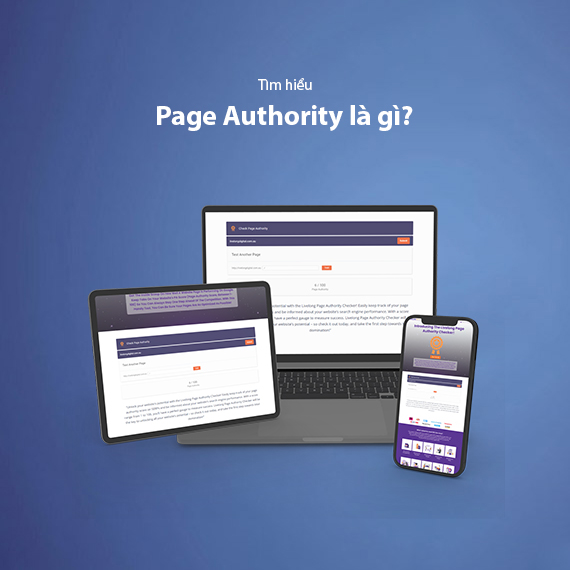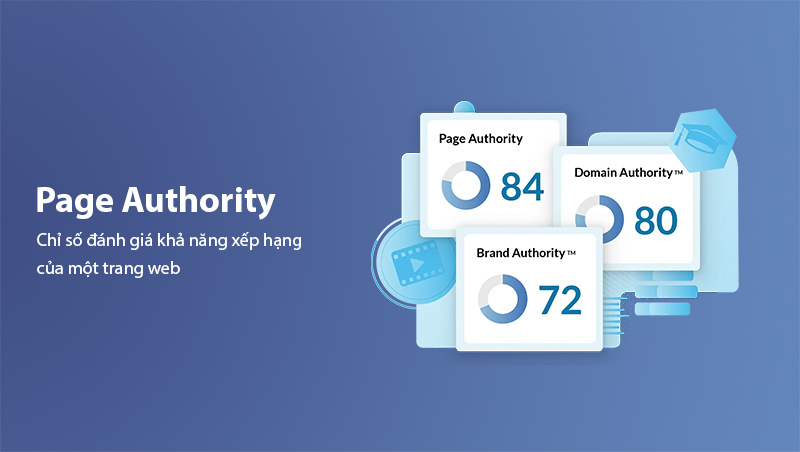What is Page Authority? How to Improve PA for SEO Optimization in 2025
- Published on

- The Impact of Page Authority (PA) on SEO
- How Page Authority (PA) is Calculated
- What is the Optimal Page Authority (PA) Score?
- Comparing PA within the Same Industry
- Difference Between Page Authority (PA) and Domain Authority (DA)
- Detailed Comparison of PA and DA
- How to Check Page Authority (PA)
- Moz Link Explorer
- MozBar (Extension)
- Ahrefs and SEMrush
- OpenLinkProfiler
- Tips for Optimizing Page Authority (PA)
- Focus on Quality Backlinks
- Use Internal Links Strategically
- Improve Page Loading Speed
- Create High-Quality Content
- Avoid Broken Links
- Adopt a Comprehensive SEO Approach
- Conclusion
Page Authority (PA) is a metric developed by Moz to assess the ranking potential of a specific webpage on search engine results pages (SERP). This metric is measured on a scale from 1 to 100; the higher the score, the greater the likelihood that the page will rank well in search results. PA is calculated based on various factors, including the number and quality of links pointing to the page, content relevance, and user experience.

Understanding Page Authority helps webmasters and SEO experts determine the credibility and strength of individual pages on a website, enabling them to develop appropriate optimization strategies to improve their rankings on search engines.
The Impact of Page Authority (PA) on SEO
Page Authority plays a crucial role in SEO optimization as it helps search engines evaluate the credibility of individual pages within a website. Here are some specific impacts of the PA metric:
- Improved search rankings: Pages with high PA are more likely to rank well on SERP, especially for highly competitive keywords.
- Effective internal linking: When pages with high PA link to other internal pages within the website, they help pass link equity and increase the ranking potential of linked pages. This creates a solid link structure that helps search engines crawl the website more efficiently.
- Increased user trust: Users tend to prioritize accessing pages that appear at the top of Google’s search results. High PA not only ensures valuable content but also indirectly boosts click-through rates (CTR) and reduces bounce rates.
Improving the PA metric is not solely about building external backlinks but also requires a strategy to develop high-quality content and use internal links effectively. For instance, if you optimize an article about website speed optimization well, it can increase the PA of that article when linked from higher-authority pages.
In summary, Page Authority significantly influences the overall SEO performance, so tracking and improving PA should be a priority in your overall optimization strategy.
How Page Authority (PA) is Calculated
The Page Authority metric is not manually assigned but is computed through complex algorithms developed by Moz. This tool uses machine learning technology to predict a score based on the following factors:
- Number and quality of backlinks: Links from reputable websites help increase your page's PA.
- Link equity distribution: Pages with too many outbound links and insufficient quality inbound links tend to have lower PA scores.
- Content signals: The content must be unique, valuable, and provide useful information to users.
Moz doesn’t rely on a single factor but combines multiple indicators to calculate PA, offering a more comprehensive view of a page's ranking potential. Although PA may fluctuate due to algorithm updates, continuously improving your content and maintaining high-quality links will ensure a stable and growing PA score over time.
Note: PA is not directly influenced by on-page optimization elements like title tags or keyword density, but these factors indirectly support PA by improving page engagement and reducing bounce rates.
Use the free Moz PA checker to evaluate your website's strength and plan adjustments accordingly in your overall SEO strategy.
Moreover, integrating internal linking strategies from high-PA pages to new pages or landing pages helps distribute link authority evenly throughout the website. For example, if your article on backlink strategies has a high PA, you can link it to other related articles to drive traffic and improve their PA metrics.
What is the Optimal Page Authority (PA) Score?
There is no fixed "perfect" Page Authority (PA) score for all websites, as it depends on the industry and level of competition. However, here are some reference points:
- 1 - 20 points: This is typical for new pages or those with few quality backlinks.
- 21 - 50 points: Websites in this range usually have good content, have started building a solid link profile, and can rank reasonably well for moderately competitive keywords.
- 51 - 70 points: A relatively high score, indicating a strong SEO strategy with backlinks from authoritative sources.
- 71 - 100 points: This score is often achieved by major websites or well-known brands that have a large number of authoritative links and high-quality content.
Therefore, a reasonable goal for most websites is to aim for a score between 40 and 60 points to remain competitive in search rankings.
Comparing PA within the Same Industry
PA should not be compared across websites from different industries but should instead be evaluated within the context of its own niche. For example, a tech news site may require a higher PA to remain competitive compared to a local travel blog.
If you're just starting to build a website, focus on creating high-quality content first, then develop a smart internal linking strategy to connect new and old articles, helping to increase PA consistently. Check out our guide on On-Page SEO optimization for better results in improving page performance.
Difference Between Page Authority (PA) and Domain Authority (DA)
While Page Authority (PA) and Domain Authority (DA) are both metrics developed by Moz to assess website credibility and strength on search engines, they differ in key ways:
- Page Authority (PA): Measures the strength of a specific page based on the quality and number of links pointing to that page.
- Domain Authority (DA): Measures the overall strength of the entire domain, including all its subpages.
Detailed Comparison of PA and DA
| Factor | Page Authority (PA) | Domain Authority (DA) |
|---|---|---|
| Scope of Evaluation | Individual page | Entire domain |
| Impact on SEO | Affects the ranking of a specific page for related keywords | Affects the overall strength of the website |
| Key Factor | Quality of links to the page | Total number of links and domain authority |
| Purpose of Use | To boost rankings for specific articles or product pages | To increase the overall credibility of the entire website |
A website may have high DA but low PA if a particular page is not well-optimized or has few quality backlinks pointing to it. Conversely, a page may have high PA but low DA if the domain is not well-optimized overall, but that specific page receives significant backlinks from authoritative sources.
Example:
- The homepage of a website often has a higher PA than subpages because it receives the most internal and external links.
- Detailed "how-to" articles or landing pages for products can have high PA even if the website's overall DA is average, thanks to smart internal linking and quality backlinks.
Optimize both PA and DA for the best SEO performance. With a credible domain, creating new subpages will be easier to achieve higher PA due to the authority inherited from the entire website.
How to Check Page Authority (PA)
To monitor and check your Page Authority (PA), you can use SEO tools that provide detailed performance analysis. Here are some popular tools:
Moz Link Explorer
The official tool from Moz used to check PA, DA, and related link metrics:
- Visit: https://moz.com/link-explorer
- Enter the URL of the page you want to check, and you'll receive a detailed report on PA, backlink count, referring domains, and more.
MozBar (Extension)
MozBar is a free Chrome extension that allows you to quickly check PA and DA while browsing the web. When activated, this tool displays the metrics directly on your browser without needing to visit Moz's website.
Ahrefs and SEMrush
Although Ahrefs and SEMrush do not directly provide PA scores like Moz, you can use related metrics such as:
- URL Rating (UR): Similar to PA, measuring the strength of a specific URL.
- Backlink Analysis: Detailed reports on the number and quality of backlinks pointing to a URL or domain.
OpenLinkProfiler
This tool also supports checking links pointing to a page and provides PA-like metrics for reference. Moreover, it's entirely free, making it an excellent choice for SEO beginners.
Note: The PA metric can change frequently due to updates in data from SEO tools and changes in SEO factors such as backlinks and internal links.
Tips for Optimizing Page Authority (PA)
Improving Page Authority (PA) cannot be done overnight but requires a long-term SEO strategy focused on quality over quantity. Here are some key tips for effective PA optimization:
Focus on Quality Backlinks
Backlinks remain the core factor in determining PA. However:
- Prioritize links from reputable websites with high Domain Authority (DA).
- Avoid links from spammy or low-quality pages, as they can negatively impact PA.
- Diversify your backlink sources rather than relying on just a few domains.
Use Internal Links Strategically
Internal links not only help direct user navigation but also distribute link equity among pages within a website:
- Link from high-PA pages to new or important landing pages to increase their ranking potential.
- Ensure internal links have a clear structure and direct users to relevant content to enhance the user experience.
Example: If you have an article about building quality backlinks, link it to detailed articles such as anchor text analysis guides or free backlink checker tools to increase time on page and reduce bounce rates.
Improve Page Loading Speed
Google increasingly prioritizes user experience, and page loading speed is a key factor influencing PA.
- Optimize images to reduce file size while maintaining display quality.
- Use a CDN (Content Delivery Network) to speed up content delivery.
- Regularly test page performance using tools like Google PageSpeed Insights or GTmetrix.
Create High-Quality Content
PA won’t increase if your page lacks engaging and useful content:
- Write in-depth, detailed content that provides practical value to readers.
- Update old articles to ensure the content remains relevant to new search trends.
- Use keywords appropriately but avoid keyword stuffing.
Avoid Broken Links
Broken links leading to nonexistent pages can negatively affect PA:
- Regularly check your website’s links using tools like Screaming Frog SEO Spider or Ahrefs Site Audit to find and fix broken links.
- Replace or implement 301 redirects for broken links to relevant pages.
Adopt a Comprehensive SEO Approach
The PA score cannot be maintained if you only focus on a few factors. Combining On-Page SEO (meta tags, content) with Off-Page SEO (backlinks, external links) helps improve PA comprehensively and sustainably.
See more: Read our article on comprehensive SEO strategies for websites to learn how to build an effective optimization plan for different content types.
Conclusion
The Page Authority (PA) metric is an essential factor in assessing the credibility and ranking potential of individual web pages. Improving PA is not solely about building quality links but also requires optimizing content, page loading speed, and user experience. A smart SEO strategy integrates these elements to ensure web pages achieve high PA scores, contributing to sustainable results in search engine rankings.
Latest Posts

Lesson 26. How to Use break, continue, and return in Java | Learn Java Basics
A guide on how to use break, continue, and return statements in Java to control loops and program execution flow effectively.

Lesson 25. The do-while Loop in Java | Learn Basic Java
A detailed guide on the do-while loop in Java, including syntax, usage, examples, and comparison with the while loop.

Lesson 24. How to Convert Decimal to Binary in Java | Learn Basic Java
A guide on how to convert numbers from the decimal system to the binary system in Java using different methods, with illustrative examples.

Lesson 23. How to Use the While Loop in Java | Learn Java Basics
Learn how to use the while loop in Java with syntax, real-world examples, and practical applications in Java programming.
Related Posts

What is Domain Authority? 13-Step Guide to Improve DA Score for Your Website in 2025
Discover what Domain Authority is and its importance in SEO. A detailed guide on the 13-step process to effectively increase DA, from content research and technical optimization to building quality backlinks for a sustainable SEO strategy.

What is Google Index? A Guide to 13 Ways to Speed Up Website Indexing in 2025
Discover what Google Index is and learn detailed guidelines on 13 effective ways to get your website indexed quickly and boost your SEO rankings on Google in 2025.
![What is Onpage SEO? 23+ Basic & Advanced Onpage Optimization Checklist [2025]](/blog-posts/seo-onpage/seo-onpage-thumb.jpg)
What is Onpage SEO? 23+ Basic & Advanced Onpage Optimization Checklist [2025]
Learn the concept of Onpage SEO and the 23+ basic to advanced Onpage optimization checklist to improve website quality and boost search rankings effectively.

What is Yoast SEO? A Comprehensive Guide to Using Yoast SEO Plugin from A-Z
Learn what the Yoast SEO Plugin is and how to use it to fully optimize SEO for your WordPress website from A-Z.

